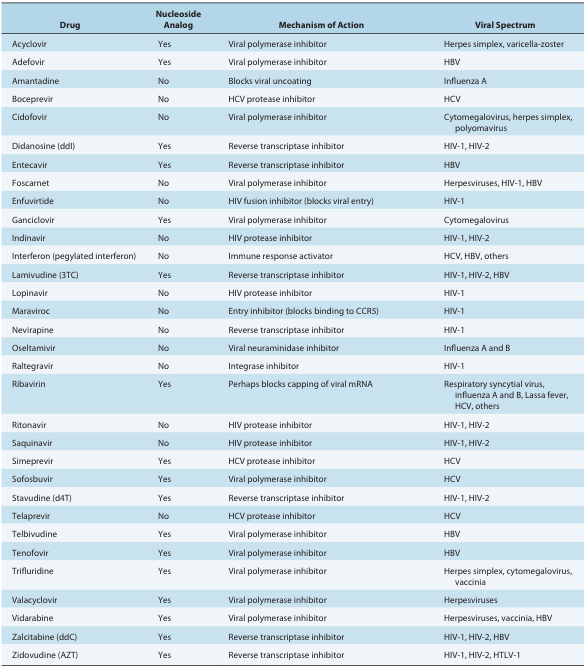


 النبات
النبات
 الحيوان
الحيوان
 الأحياء المجهرية
الأحياء المجهرية
 علم الأمراض
علم الأمراض
 التقانة الإحيائية
التقانة الإحيائية
 التقنية الحيوية المكروبية
التقنية الحيوية المكروبية
 التقنية الحياتية النانوية
التقنية الحياتية النانوية
 علم الأجنة
علم الأجنة
 الأحياء الجزيئي
الأحياء الجزيئي
 علم وظائف الأعضاء
علم وظائف الأعضاء
 الغدد
الغدد
 المضادات الحيوية
المضادات الحيوية|
Read More
Date: 18-11-2015
Date: 19-11-2015
Date: 20-11-2015
|
Unlike viruses, bacteria and protozoans do not rely on host cellular machinery for replication, so processes specific to these organisms provide ideal targets for the development of antibacterial and antiprotozoal drugs. Because viruses are obligate intracellular parasites, antiviral agents must be capable of selectively inhibiting viral functions without dam aging the host, making the development of such drugs very difficult. Another limitation is that many rounds of virus replication occur during the incubation period and the virus has spread before symptoms appear, making drug treatment at that time relatively ineffective.
There is a need for antiviral drugs active against viruses for which vaccines are not available or not highly effective because of a multiplicity of serotypes (eg, rhinoviruses) or because of a constantly changing virus (eg, influenza, HIV). Antivirals can be used to treat established infections when vaccines would not be effective. Antivirals are needed to reduce morbidity and economic loss caused by viral infections and to treat increasing numbers of immunosuppressed patients who are at increased risk of disease.
Molecular virology studies are succeeding in identifying virus-specific functions that can serve as targets for antiviral therapy. Stages during viral infections that could be targeted include attachment of virus to host cells, uncoating of the viral genome, viral nucleic acid synthesis, translation of viral proteins, and assembly and release of progeny virus particles. It has been very difficult to develop antivirals that can distinguish viral from host replicative processes, but there have been successful drugs developed, particularly for chronic infections (eg, HIV, hepatitis C). A number of compounds have been developed that are of value in treatment of viral diseases (Table 1). The mechanisms of action vary among antivirals, and can target a viral protein enzymatic activity or block host–virus protein interaction. Some drugs must be activated by enzymes in the cell before it can act as an inhibitor of viral replication; the most selective drugs are activated by a virus-encoded enzyme in the infected cell.

table1. Examples of Antiviral Compounds Used for Treatment of Viral Infections
Future work is necessary to minimize the emergence of drug-resistant variant viruses, to reduce drug toxicities, to design more specific antivirals based on molecular insights into the structure of other viral targets, and to develop antivirals for viruses for which no drugs currently exist



|
|
|
|
دليل التغذية الأولى للرضيع.. ماذا أنسب طعام بعد 6 شهور؟
|
|
|
|
|
|
|
ماذا نعرف عن الطائرة الأميركية المحطمة CRJ-700؟
|
|
|
|
|
|
|
شعبة الخطابة الحسينية النسوية تطلق اختبارات مسابقة (سبيل المنتظرين) في كربلاء المقدسة
|
|
|